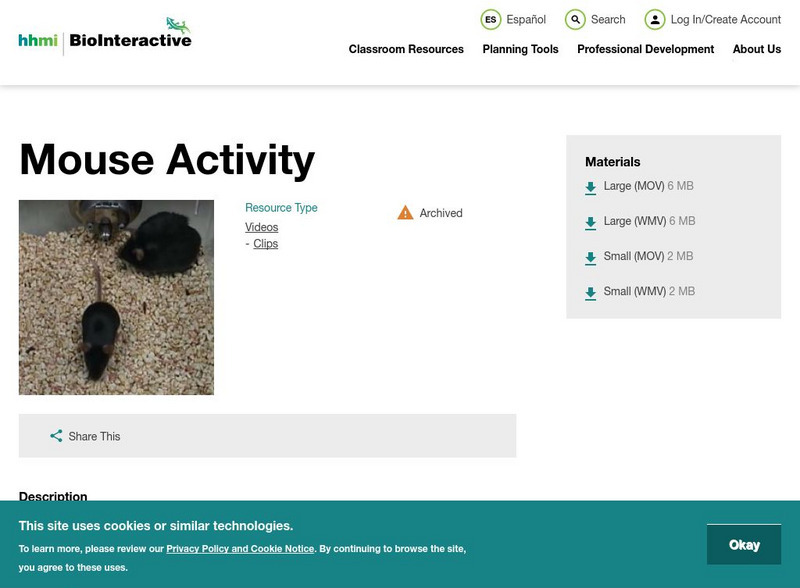Hi, what do you want to do?
Howard Hughes Medical Institute
The Birth and Death of Genes
Notothenioids are not your average fish—they contain antifreeze! An interesting video introduces the icefish, a scaleless fish with colorless blood that lives in the oceans around Antarctica. It explains how gene duplication and...
Howard Hughes Medical Institute
The Beak of the Finch
You've got to use the right beak for the right job. Viewers of an informative video learn about the evolution of finches on the Galapagos Islands. They learn how different habitats and foods led to an adaptation of beaks, resulting in...
Howard Hughes Medical Institute
How We Get Our Skin Color Interactive
I can see your epidermis. A short video shows how we get our skin color. It explains how melanocyte cells in the epidermis produce melanin, and that the type and amount of melanin controls skin color.
Howard Hughes Medical Institute
Popped Secret Film with Quiz: The Mysterious Origin of Corn
Where does corn come from? Corn cobs? Scholars watch an interesting video to learn that the ancestor of maize is the teosinte plant. The video goes on to explain how both geneticists and archaeologists have evidence that humans were...
Howard Hughes Medical Institute
Great Transitions: The Origin of Birds
Did you know T-Rex had a wish bone? This is one of the many pieces of evidence to support the idea that therapod dinosaurs evolved into modern-day birds. An engaging video describes some of the other pieces of evidence and how...
Howard Hughes Medical Institute
Great Transitions: The Origin of Humans
What makes you human? Bipedality, tool use, and large brains, of course! Scholars learn about the early evolution of humans by watching a video. Scientists explain the challenges in studying early humans and the information gleaned from...
Howard Hughes Medical Institute
Skin Color Interactive Video: The Biology of Skin Color
It's all just skin deep. An anthropologist explains in a video how she used UV radiation data from NASA to come up with a theory on how human skin color has evolved over time. The skin has to be dark enough to block harmful UV radiation,...
Howard Hughes Medical Institute
Got Lactase? The Co-Evolution of Genes and Culture
Only one-third of human adults can digest milk. If you're one of the lucky few, you have gene-culture co-evolution to thank. Scholars watch a video to learn how the enzyme lactase is necessary to break down lactose in milk. The gene...
Howard Hughes Medical Institute
The Making of the Fittest: Evolving Switches, Evolving Bodies
How did the stickleback fish, which was once ocean bound, evolve to be able to persist in freshwater lakes? Hear from the scientists who identified the genes and related switches that allowed these survivors to adapt. In addition to the...
Howard Hughes Medical Institute
Hhmi: Bio Interactive: Dna
A site full of information about DNA. Explore animations showing the details of DNA replications and transcription, view a lecture on DNA lab techniques, and look at online interactives to explore evolutionary relationships.
Howard Hughes Medical Institute
Hhmi: Biointeractive: The Chemical Structure of Dna
A video discussing a variety of biotechnology applications that can be completed based on DNA's chemical properties. [2:44]
Howard Hughes Medical Institute
Hhmi: Biointeractive: Dna: Human Chromosomes
Human chromosomes explained in this brief description of human cell biology. [0:47]
Howard Hughes Medical Institute
Hhmi: Bio Interactive: Mouse Activity
A comparison of a normal mouse with one with a mutated gene.
Howard Hughes Medical Institute
Hhmi: Bio Interactive: How Tumors Grow
An excellent BioInteractive animation describing factors related to the growth of tumors with audio and text support. Strong supporting material for teachers and students.
Howard Hughes Medical Institute
Hhmi: Bio Interactive: Bio Interactive: Birth and Death of Genes
Classroom resources paired with a thirteen-minute video highlight how scientists discovered the evolutionary history of an Antarctic icefish by studying its genome.
Howard Hughes Medical Institute
Hhmi: Biointeractive: Viral Outbreak: Viral Geometry and Structural Diversity
Learn about the geometrical structure of three different viruses, and how these structures affect the function of each virus. [3:22]
Howard Hughes Medical Institute
Hhmi: Biointeractive: The Chemical Structure of Dna
Learn how the chemical properties of the DNA molecule determine its structure and function in this video. [2:45]
Howard Hughes Medical Institute
Hhmi: Biointeractive: Viral Outbreak: The Polymerase Chain Reaction (Pcr)
Learn how a standard lab technique, polymerase chain reaction, amplifies a single or several copies of a piece of DNA. [0:55]
Howard Hughes Medical Institute
Hhmi: Biointeractive: Stem Cells: Differentiation and the Fate of Cells
See how the three germ layers in early embryonic development eventually lead to the formation of major human organs. [1:29]
Howard Hughes Medical Institute
Hhmi: Biointeractive: Stem Cells: Newt Limb Regeneration
Watch this animation of newt limb regeneration, and find out how specialized cells make it happen in a relatively short period of time. [1:20]
Howard Hughes Medical Institute
Hhmi: Bio Interactive: Fossil Record of Stickleback Evolution
A close-up look at the fossil records of the stickleback fish. [1:26]
Howard Hughes Medical Institute
Hhmi: Bio Interactive: Health Brigades in Managua's Neighborhoods
A brief video explaining mosquito control in Nicaragua. [1:01]
Howard Hughes Medical Institute
Hhmi: Bio Interactive: Hiv's Origins in Africa
A brief video explaining the origins of the HIV virus. [1:12]
Howard Hughes Medical Institute
Hhmi: Bio Interactive: Fruit Fly Courtship
Discover how wing spots are involved in fruit fly courtship. [0:55]





















